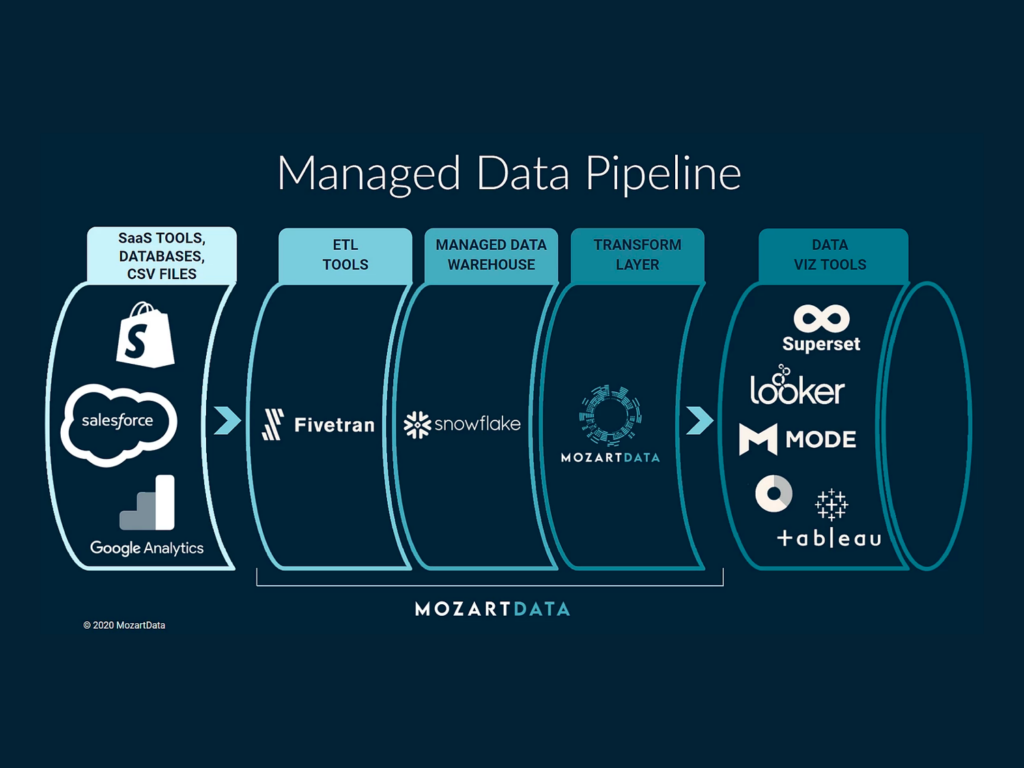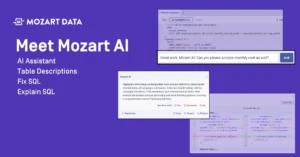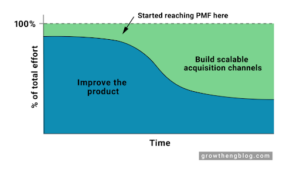Using data to unlock key business insights is a pivotal part of growth for any company, but becoming a data-driven company is a challenging task that won’t happen overnight. It requires:
-
A large amount of data infrastructure setup and maintenance.
-
Determining key leading metrics and the most important questions to be answered.
-
Having your employees buy into the structure and associated processes.
Put more concisely, it comes down to 3 main factors — tools, good decision-making, and culture.
Mozart Data helps companies become data-driven by:
-
Quickly setting up and providing ongoing maintenance of data infrastructure.
-
Negotiating contracts with data service providers on the behalf of our customers.
-
Providing analytics support to help establish key metrics, determine the most important questions to ask, and create associated dashboards and automations to track this information. These can then be used throughout the company as the source of truth for its data.

What does it mean to be data-driven?
For a business to be data-driven, it needs to be growing and learning about itself through measured data. A data-driven company will make decisions based on determining the right questions to be answered and closely tracking the associated data. A data-driven company also aims to remove emotions and speculation from its decision-making process. There are several ways to accomplish these goals.
How to become a data-driven company
To become truly data-driven, companies need to have:
-
A reliable set of data that everyone at the company agrees to being the source of truth
-
Definitions around different key metrics and questions to be answered
-
Buy-in from everyone on how to use the data and make decisions accordingly.
It takes practice to become proficient at this, and it can take a long time to hone in on what changes positively affect a company’s bottom line.
Utilize new data technologies

Mozart uses Fivetran and Snowflake under the hood to do exactly that. We can set up a managed data pipeline in under an hour, and we do all of the contract negotiation and management w/ these service providers so our customers can spend more time on what actually matters — using key insights from their data and creating actionable decisions.
Determine key metrics to track
To be data-driven, every company needs to define what its “North Star” metric and other leading metrics are. A North Star metric needs to be one that every team at the company can contribute to. It should:
-
Assess the company’s overall progress
-
Be a leading indicator of revenue generation
-
Represent customer value
Our friends over at Mixpanel have a great article on North Star metrics and examples of some for different industries.
Determining the most important metrics simultaneously gives a company direction and helps avoid time-consuming distractions.
Often, businesses believe they are data-driven because they have a few basic graphs that allow them to track sales and usage of their product. They end up missing a lot of the nuance that’s going on with their product. They need to be answering questions about why they saw growth or decay in these parts of their business, instead of simply understanding that the growth or decay happened. Then these companies can take those findings and make meaningful changes to their business.
Conversely, some businesses think that analyzing all of their data makes them data-driven. Looking at too much data can often obfuscate answers to key questions and can overwhelm analytics teams into inaction. Businesses need to be honing in on its most important data over time and should be shaping its key metrics to match this. If you have too much data, you may not be doing this quickly enough to capitalize on the insights.
Create a strong data culture

Creating a modern data pipeline and determining key metrics isn’t enough if the whole company doesn’t buy into what’s being tracked and how to take action from it. To become an effective, data-driven company, it needs to create a strong data culture and democratize its data across the company.
This means that your employees:
-
Have access to pertinent data.
-
Are looking at the same data and sources of truth.
-
Are able to understand the data and analyze it.
-
Are taking meaningful actions based on their analyses.
A good way to ensure a strong data culture is to have solid documentation on your databases, data definitions, and data access points. These can be shared throughout the company and used during training, employee onboarding, and for on-going reference.
If a company has a weak data culture, the analytics team can be so busy explaining data to the rest of the company that they aren’t able to focus on their own important tasks. Additionally, if different teams within a company don’t have consistent understandings of the data they are analyzing, it can slow down the decision-making process and even create unnecessary division within the company.
—
Mozart Data can build the core foundation from which your company can become truly data-driven by providing data technologies and analytics support. Start the process today by booking a demo!
If you’re interested in improving the state of data tooling — we’re hiring! Check out the open rolls on our careers page.


